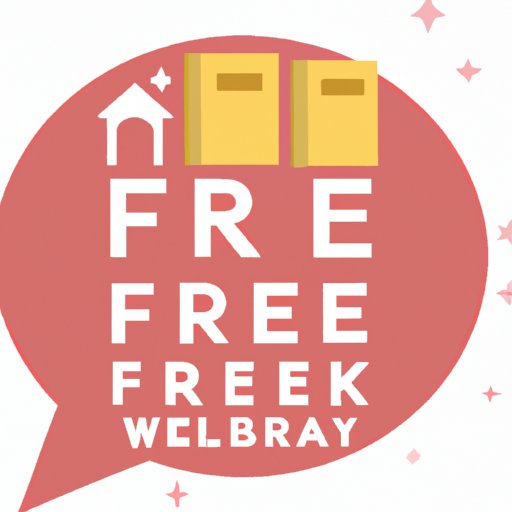
I. Introduction
Reading is an essential activity that helps improve knowledge, vocabulary, and imagination. However, buying books can be costly and not everyone can afford it. Fortunately, there are various alternatives for those seeking to read for free. This guide will provide a comprehensive overview of where to read free books.
II. Online Libraries
Online libraries are digital collections that provide access to thousands of free e-books. These libraries are accessible from anywhere in the world and offer a wide range of genres and topics. Some of the most popular online libraries include:
- Project Gutenberg: A digital library that offers over 60,000 free e-books that are in the public domain.
- Google Books: A platform that provides access to millions of books, including public domain and out of print titles.
- Open Library: An online library that offers over a million free e-books that are available to borrow for a limited time.
The advantages of using online libraries include convenience, availability, and the ability to access the content from any location. However, the disadvantages may include limited access to new releases and the need for an internet connection to access the content.
III. Local Libraries
Local libraries are community resources that provide free access to books, magazines, and other reading materials. Many libraries also offer e-book collections that can be accessed using a library card. Some of the most popular local libraries that offer free e-books include:
- New York Public Library: Offers access to over 300,000 e-books through its SimplyE app.
- Los Angeles Public Library: Offers free access to over 30,000 e-books that can be borrowed using a library card.
- Chicago Public Library: Offers access to thousands of e-books that are available to borrow using a library card.
Local libraries offer the advantage of both physical and digital collections. A library card is usually required to access e-books and borrowing policies may vary from library to library. The main disadvantage of using local libraries may include limited availability of popular titles and the physical location constraints.
IV. Book Swapping
Book swapping websites are online platforms that allow users to exchange books for free. Users can create a profile and list the books they are willing to swap. Some of the most popular book swapping websites include:
- BookMooch: A platform that allows users to exchange books with other users in different parts of the world.
- PaperbackSwap: A website that allows users to swap their paperback books with other users in the US.
The advantages of book swapping include the ability to exchange books without any costs and the opportunity to connect with other readers. The main disadvantage may be limited availability of books and shipping costs may apply.
V. Little Free Libraries
Little Free Libraries are small outdoor bookcase structures that can be found in various locations such as parks, neighborhoods, and street corners. These libraries are usually stocked with donated books and offer free access to anyone who wishes to take or leave a book. Some benefits of using Little Free Libraries include:
- Easy access to books for those who cannot afford to buy books or access local libraries.
- The opportunity to contribute to the library by donating books.
- The chance to build a sense of community by sharing books with others.
Some examples of where to find Little Free Libraries include public parks, residential neighborhoods, and near public transportation stops.
VI. Free Book Apps
Free book apps are mobile applications that allow users to access and read free e-books. Some of the most popular free book apps include:
- Libby: An app that allows users to borrow e-books and audiobooks from local libraries.
- OverDrive: An app that allows users to access e-books and audiobooks from thousands of libraries around the world.
- Hoopla: An app that offers free access to e-books, audiobooks, movies, and TV shows from participating local libraries.
The advantages of using free book apps include convenience, availability, and the ability to access the content offline. However, the disadvantages may include limited access to new releases and the need for an internet connection to access the content.
VII. Book Giveaways
Book giveaways are promotions where books are offered for free by websites, blogs, and publishers in exchange for email sign-ups or social media follows. Some websites, blogs, and publishers that offer free book giveaways include:
- Goodreads: Offers frequent book giveaways that are open to anyone who has a Goodreads account.
- Tor Books: A publisher that offers free e-book giveaways through its newsletter.
- Freebooksy: A website that offers daily free book promotions in various genres.
The advantages of book giveaways include free access to new releases and the ability to discover new authors and genres. The main disadvantage may be limited availability of free books and the need to provide personal information in exchange for the free books.
VIII. Free E-book Websites
Free e-book websites are online platforms that offer access to free e-books. These websites can be accessed from anywhere with an internet connection. Some of the most popular free e-book websites include:
- ManyBooks: A website that offers over 50,000 free e-books in various genres.
- Free-eBooks.net: A website that offers free access to over 5,000 e-books that can be downloaded for free.
- eBooks.com: A website that offers free access to a list of popular classics.
The advantages of using free e-book websites include convenience, wide variety, and the ability to access the content offline. The disadvantage may be the limited availability of new releases and the need to search for the desired titles.
IX. Conclusion
Reading is an essential activity that provides immense benefits for personal and intellectual growth. Fortunately, there are various resources that provide free access to books for those who cannot afford to buy them. This article provided a comprehensive overview of where to read free books, including online and local libraries, book swapping, Little Free Libraries, free book apps, book giveaways, and free e-book websites.




